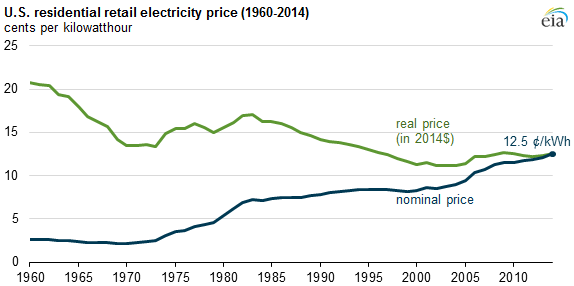This is an economic concept that escapes many liberals. We have people, mostly the elderly, right now who survive only on SS checks. When the minimum wage goes up that much, so does the cost companies charge for their products and services in order to accommodate the higher wages.
That is the
theory, but theories are not proof.
That's why they are running empirical studies like this, to determine whether or not raising minimum wages has any measurable impact on inflation or employment.
When the cost of living goes up -- who is hurt the most?
Inflation doesn't necessarily hurt anyone. A low rate of inflation, like we've seen for the past ~30 years, is actually beneficial.
Social Security is indexed to inflation. Usually, so are wages, returns on investments, and interest rates at banks.
Some people have suggested that a little more inflation is a good thing. One result of a moderate level of inflation (around 5%) is that it encourages people to buy, which stimulates consumer activity.
In fact, it is plausible that one reason why wages aren't keeping up with inflation is because minimum wages are not indexed to inflation. 35 million Americans are paid MW; and bumps to MW often increase wages for those whose pay is close to MW.
Also, the opposite of inflation is deflation, which is considered very bad for an economy. When people believe that prices will go down in the future, they tend to hold off on purchases (especially big-ticket items like appliances or cars). This in turn shrinks demand, which means companies manufacture fewer goods, and start to lay off employees, which further reduces demand. The deflationary cycle is one reason why the Great Depression became so disastrous.
What does that elderly person (or any poor person) do when they can no longer pay the energy bill to cool the house? They go without, obviously. While the young have a shot at getting a job, the elderly do not.
Social Security does go up when inflation goes up.
People are continuing to work, even as they get older. Some people are working well into their 70s and even 80s. Granted, it's not always for the best of reasons; many people haven't saved adequately for retirement. That said, it's very likely that older workers will benefit from a boost in the minimum wage.
Energy prices are not going through the roof. Nor are they likely to do so, because of minimum wage increases. Most MW workers are in the service sector, and it takes a heck of a lot for prices of check-out clerks at Walmart to cause electricity prices to go up.
Even if increases in energy prices are deadly (gasp horror shock!!!), does that justify us doing something like subsidize residential energy costs for the poor? How much is too much to pay for electricity? Should we never do anything to increase electrical prices like... fix our aging grid infrastructure (a primary cause of recent energy price increases)?
You also do know that real residential electricity prices are actually down, compared to costs for most of the 20th century, yes?
Already energy prices are going up, and if the eco-freaks have their way, they'll go up more. What are they thinking? Answer -- they don't think.
...or, they know that environmental actions will not, in fact, inflate energy prices beyond control.
...or, they know that inflation is not a death sentence for seniors.
...or, they know that the energy industry does not rely heavily on minimum-wage employees. Energy costs are not going to go through the roof because we bumped up minimum wages by a few dollars.

